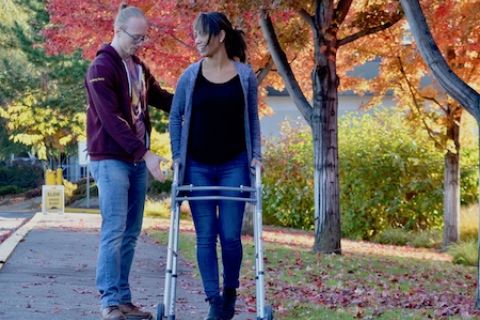College’s Therapist Assistant program earns new national accreditation

As career goals go, what could be more meaningful than improving someone’s quality of life?
For therapist assistants, it’s more than a goal, it’s a daily reality – and you’ll find these in-demand health professionals supporting people’s rehabilitation in a vast array of settings.
This spring, Okanagan College’s Therapist Assistant Diploma (TAD) program – which has been educating Physical therapist assistants (PTA), Occupational therapist assistants (OTA) and Recreation therapist assistants (RTA) for almost 30 years – has earned a new feather in its cap.
The TAD program was recently awarded full accreditation status by the national accrediting body comprised of the Occupational Therapist Assistant and Physiotherapist Assistant Education Accreditation Program (OTA & PTA EAP), Physiotherapy Education Accreditation Canada (PEAC) and the Canadian Association of Occupational Therapists (CAOT).
For TAD program Chair Jennifer Stephenson, the accreditation, effective now through April 2025, is the culmination of months of work by the instructor team with support from administration to rigorously evaluate and continue to enhance every aspect of the program.
“What is most rewarding about this accreditation is that the evaluators studied every aspect of how we educate our students, how we collaborate with other departments at the College and how strong our relationships are with our community partners, who in turn work with us to provide clinical placements for students.”
Adds Stephenson: “It’s an evaluation of every facet of the program, and every person it impacts – from students to partners to our clients and patients in the community.”
“This accreditation demonstrates that our program is aligned with the very latest practices and standards of care,” notes Yvonne Moritz, Dean of Science, Technology and Health at Okanagan College. “It affirms that we are delivering the highest quality education, which translates to the highest quality care for people in the community. That in turn gives our students confidence knowing that when they graduate, they are going to be looked upon by employers as well-trained, ready to go, and they are going to be in-demand.”
The program has a long history of producing skilled graduates to serve the region and beyond.
It launched as a ten-month certificate in 1990, before evolving into a two-year diploma in 2005 and was one of only a few OTA/PTA programs to be piloted by the newly formed accreditation body.
And while national accreditation is nothing new for the program, this latest enhanced recognition is proof that the training is more relevant than ever – a message that is an important one for students to hear, notes Stephenson.
“Along with accreditation comes the continued evaluation and refinement of the program, which ensures currency of knowledge and skills and helps students better understand their evolving role and scope of practice.”
The TAD program includes four full semesters of course work, along with 18 weeks of practical experience in clinical settings, giving students an idea of the vast positions that await them post-graduation.
The arrival of COVID-19 in the province earlier this spring forced instructors and students – like so many other health care providers – to find innovative ways to support clients virtually to gain those much-needed clinical hours.
“It wasn’t long before the instructor team was able to create alternative online learning activities and virtual clinical experiences for the students,” explains Stephenson. “Students and instructors alike embraced that challenge, and the feedback from those they are working with in the community has been very positive.”
One of the most inspiring ways students have connected with people in need of online assessment or treatment has been through program alumni, notes Stephenson.
When TAD instructors reached out to past grads, they were met with an overwhelming response as many alumni stepped up to spread the word and help current students get their much-needed hours.
“Thanks to our alumni, our students have been connecting with people all across the province from the coast to 100 Mile House to the Kootenays. We’re deeply grateful to our alumni and feel very inspired by the fact that they stay in touch, they’re connected with the program and want to support students following in their footsteps.”
You don’t have to look far to find evidence of students’ commitment to supporting their communities. They recently made headlines for their T-Glove project designed to help quadriplegics. Their efforts to sew hundreds of face masks for those in need during COVID-19 also garnered positive attention in the community, as well as a shoutout on Twitter from the Honourable Melanie Mark, Minister of Advanced Education, Skills & Training and a retweet from Premier John Horgan’s constituency twitter account (Saanich North & the Islands NDP provincial constituency).
The TAD program is offered at the College’s Kelowna campus. More information about the program is available at okanagan.bc.ca/tad.
Tags: Therapist Assistant, Health and Social Development, Accreditation




